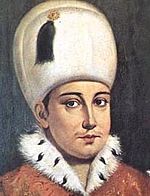- Osman II
-
 Osman II
Osman IIOttoman Sultan Caliph 
Reign 1618–1622 Period Growth of the Ottoman Empire Full Name Sultan Osman II Born November 3, 1604 Died March 20, 1622 (aged 17) Predecessor Mustafa I (The Intestable) Successor Mustafa I (The Intestable) Royal House House of Osman Dynasty Ottoman Dynasty Sultan Osman II or Othman II (commonly known as Genç Osman – meaning Osman the Young – in Turkish) (Ottoman Turkish عثمان ثانى ‘Osmān-i sānī) (November 3, 1604 – May 20, 1622) was the Sultan of the Ottoman Empire from 1618 until his death on 20 May 1622. He married Aisha, born in 1607, without issue.
Biography
Osman II was born at Topkapı Palace, Istanbul, the son of Sultan Ahmed I (1603–17) and his wife Mâh-Firûze Hatice (Khadija) Valide Sultan, originally named Maria, a Greek.[1] At a young age his mother paid a lot of attention to his education, as a result of this Osman II was a known poet and had mastered many languages, including Arabic, Persian, Greek, Latin and Italian. He ascended the throne at the early age of 14 as the result of a coup d'état against his uncle Mustafa I (The Intestable) (1617–18, 1622–23). Despite his youth, Osman II soon sought to assert himself as a ruler, and after securing the empire's eastern border by signing a peace treaty (treaty of Serav) with Safavid Iran, he personally led the Ottoman invasion of Poland during the Moldavian Magnate Wars. Forced to sign a peace treaty with the Poles after the Battle of Chotin (Chocim) (which was, in fact, a siege of Chotin defended by the Polish hetman Jan Karol Chodkiewicz) in September–October, 1621, Osman II returned home to Istanbul in shame, blaming the cowardice of the Janissaries and the insufficiency of his statesmen for his humiliation.
Probably the first Sultan to identify and attempt to tackle the Janissaries as a praetorian institution doing more harm than good to the modern empire, Osman II closed their coffee shops (the gathering points for conspiracies against the throne) and started planning to create a new, loyal and ethnic Turkic army consisting of Anatolian, Mesopotamian and Egyptian Turks and Turkmens. The result was a palace uprising by the janissaries, who promptly imprisoned the young sultan. When an executioner was sent to strangle him at Yedikule, Istanbul, Osman II refused to give in and started fighting the man and was only subdued when he was hit on his back with the rear end of an axe by one of his imprisoners. After that he was strangled with a bowstring. Alternatively, Turkish traveller Evliya Celebi recorded that after a putting up a desperate struggle, Osman was killed by the Grand Vizier Kara Davud Paşa (Black David Pasha) from compression of his testicles which was a mode of execution reserved by custom to the Ottoman sultans.[2] A combination of these stories is given by the French traveler Pouqueville, who writes that when the cord was thrown over his neck, Osman 'had the presence of mind to slip it with his hand, and knock down the principal executioner; on which his grand vizier seized him by the most sensible part of his body, when Osman fainted with pain, and was strangled.' [3]
Notes
- ^ Shaw, Stanford Jay. History of the Ottoman Empire and Modern Turkey. Cambridge University Press. p. 191.
- ^ Goodwin, Jason: Lords of the Horizons, chapter 15: The Cage, published 1998
- ^ Pouqueville, François Charles H.L.: Travels through the Morea, Albania, and several other parts of the Ottoman Empire, page 113-114, published 1806
External links
Osman IIBorn: November 3, 1604 Died: May 20, 1622Regnal titles Preceded by
Mustafa ISultan of the Ottoman Empire
Feb 26, 1618 - May 20, 1622Succeeded by
Mustafa ISunni Islam titles Preceded by
Mustafa ICaliph of Islam
Feb 26, 1618 - May 20, 1622Succeeded by
Mustafa IOttoman Sultans / Caliphs Dynasty · Family tree (detailed) · Family tree (simplified) · Line of succession Osman I · Orhan · Murad I · Bayezid I · Interregnum · Mehmed I · Murad II · Mehmed II · Murad II · Mehmed II · Bayezid II · Selim I · Suleiman I · Selim II · Murad III · Mehmed III · Ahmed I · Mustafa I · Osman II · Mustafa I · Murad IV · Ibrahim · Mehmed IV · Suleiman II · Ahmed II · Mustafa II · Ahmed III · Mahmud I · Osman III · Mustafa III · Abdülhamid I · Selim III · Mustafa IV · Mahmud II · Abdülmecid I · Abdülaziz · Murad V · Abdülhamid II · Mehmed V · Mehmed VI · Abdülmecid II (Caliph)Related Templates: Claimants · Valide Sultans Categories:- 1604 births
- 1622 deaths
- 1622 crimes
- Modern child rulers
- Murdered monarchs
- Assassinated caliphs
- 17th-century Ottoman sultans
- People from Istanbul
- Assassinated Ottoman people
- Ottoman sultans born to Greek mothers
Wikimedia Foundation. 2010.

